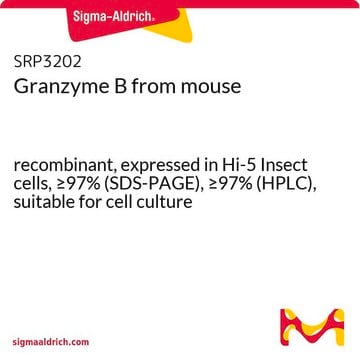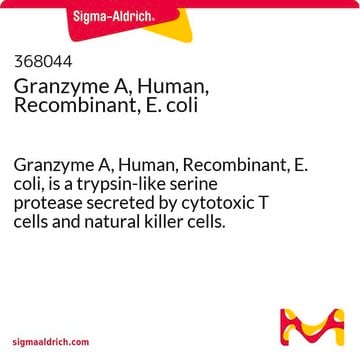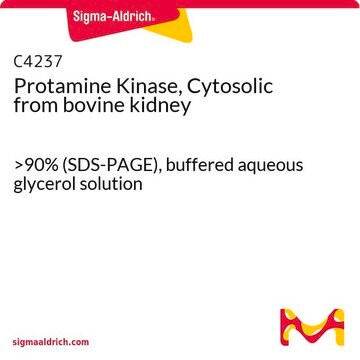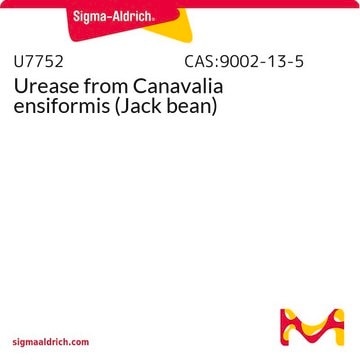G9278
Granzyme B from mouse
≥90% (SDS-PAGE), recombinant, expressed in Pichia pastoris, buffered aqueous solution, ≥10,000 units/mg protein
Sinónimos:
GzmB
Iniciar sesiónpara Ver la Fijación de precios por contrato y de la organización
About This Item
MDL number:
UNSPSC Code:
12352202
Productos recomendados
recombinant
expressed in Pichia pastoris
assay
≥90% (SDS-PAGE)
form
buffered aqueous solution
specific activity
≥10,000 units/mg protein
UniProt accession no.
shipped in
dry ice
storage temp.
−70°C
Gene Information
mouse ... Gzmb(14939)
General description
Granzyme B, a 247 amino acid polypeptide, contains a leader sequence, which is cleaved by a signal peptidase and a two amino acid prodomain, which is cleaved by the lysosomal cysteine protease DPPI. The recombinant granzyme B is expressed in Pichia pastoris as the mature form and appears on SDS-PAGE as a triplet (~34, 32, and 30 kDa) due to three different glycosylations.
Biochem/physiol Actions
Cytotoxic granules secreted by natural killer (NK) cells and cytotoxic T Lymphocytes cells are part of the mechanism used for protecting the organism from virus infected and tumor cells. Granzyme B, a serine protease, is the most prominent granzyme in a family of 11 found in the cytotoxic granules. The granzymes enter the target cell with the assistance of perforin, a critical molecule of the cytotoxic granules. In the target cell, the granzymes act on specific substrates involved with the cell death via apoptosis.
Granzyme B is a neutral serine protease that cleaves aspartic acid residues, inducing cell death by various pathways. It can cleave and activate most of the caspases in vitro and in vivo resulting in a massive amplification of the caspase dependent apoptotic pathway. In addition, granzyme B cleaves directly downstream caspase substrates as PARP DNA-PK2 and DFF45/ICAD leading to cell death. This pathway bypasses inhibition of apoptosis by viral caspase inhibitors found in virus infected cells. It has been shown that granzyme B is capable of inducing cytochrome C release from the mitochondria in a caspase independent way.
Granzyme B is a neutral serine protease that cleaves aspartic acid residues, inducing cell death by various pathways. It can cleave and activate most of the caspases in vitro and in vivo resulting in a massive amplification of the caspase dependent apoptotic pathway. In addition, granzyme B cleaves directly downstream caspase substrates as PARP DNA-PK2 and DFF45/ICAD leading to cell death. This pathway bypasses inhibition of apoptosis by viral caspase inhibitors found in virus infected cells. It has been shown that granzyme B is capable of inducing cytochrome C release from the mitochondria in a caspase independent way.
Features and Benefits
Pichia expressed recombinant Granzyme B has the advantage over native Granzyme B as the latter can be purified only in limited amounts, and over E. coli and vaccinia virus expressed enzymes that failed to generate soluble active enzyme.
Unit Definition
One unit will hydrolyze 1.0 nmole of Boc-Ala-Ala-Asp-sBzl per min at 30 °C.
Physical form
Solution in 50 mM HEPES, pH 7.5 , containing 150 mM NaCl.
Preparation Note
Recombinant Granzyme B expressed in Pichia pastoris is a soluble secreted form of the active enzyme with the same specificities as native Granzyme B. This recombinant, active, mature Granzyme B can cleave caspase 3 both in vitro and in vivo to its signature p20/p10 forms.
Storage Class
10 - Combustible liquids
wgk_germany
nwg
flash_point_f
Not applicable
flash_point_c
Not applicable
ppe
Eyeshields, Gloves, multi-purpose combination respirator cartridge (US)
Elija entre una de las versiones más recientes:
¿Ya tiene este producto?
Encuentre la documentación para los productos que ha comprado recientemente en la Biblioteca de documentos.
C T Pham et al.
The Journal of biological chemistry, 273(3), 1629-1633 (1998-01-27)
Granzyme B (GzmB) is a neutral serine protease found in cytotoxic lymphocytes; this enzyme is critically involved in delivering the rapid apoptotic signal to susceptible target cells. GzmB has been difficult to study and has not yet been produced in
S Goenka et al.
Journal of immunology (Baltimore, Md. : 1950), 163(9), 4663-4672 (1999-10-21)
The cytokines IL-4 and IFN-gamma exert biologically antagonistic effects that in part reflect opposing influences on gene transcription. While the molecular mechanisms for IL-4-mediated transcription activation have been extensively studied, little is known about molecular mechanisms required for IL-4 inhibition
D A Thomas et al.
Immunity, 12(6), 621-632 (2000-07-14)
Granzyme B (GzmB) is a component of cytotoxic lymphocyte granules that can rapidly initiate apoptosis in target cells. While several procaspases are cleaved and activated by GzmB, the absolute requirement of caspase activation for GzmB-induced apoptosis is controversial. In this
J A Trapani et al.
Immunology today, 20(8), 351-356 (1999-08-04)
Viral strategies for escaping apoptosis have co-evolved with the immune system, resulting in a complex balance of pro- and anti-apoptotic forces in virus-infected cells under attack by cytotoxic T lymphocytes (CTLs). Here, Joseph Trapani and colleagues argue that CTL cytolytic
J A Trapani et al.
Current opinion in immunology, 12(3), 323-329 (2000-04-27)
Recent advances in our understanding of cytolytic effector mechanisms include the partial characterization of caspase-independent apoptotic pathways triggered by granzymes, a realization of the vital importance of perforin and granzymes in the defence against certain virus infections in vivo and
Nuestro equipo de científicos tiene experiencia en todas las áreas de investigación: Ciencias de la vida, Ciencia de los materiales, Síntesis química, Cromatografía, Analítica y muchas otras.
Póngase en contacto con el Servicio técnico







